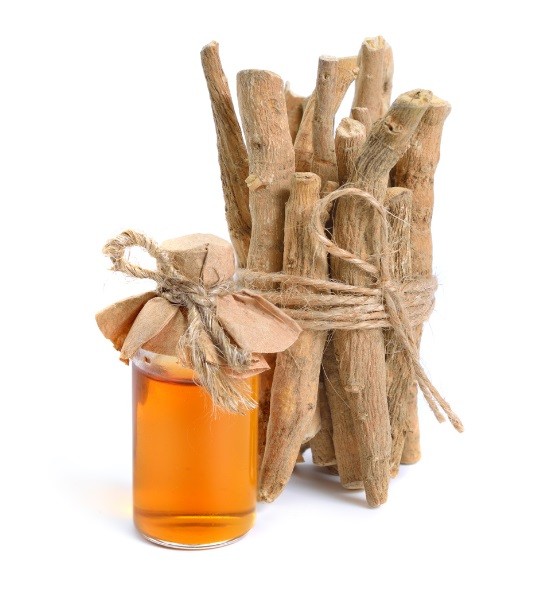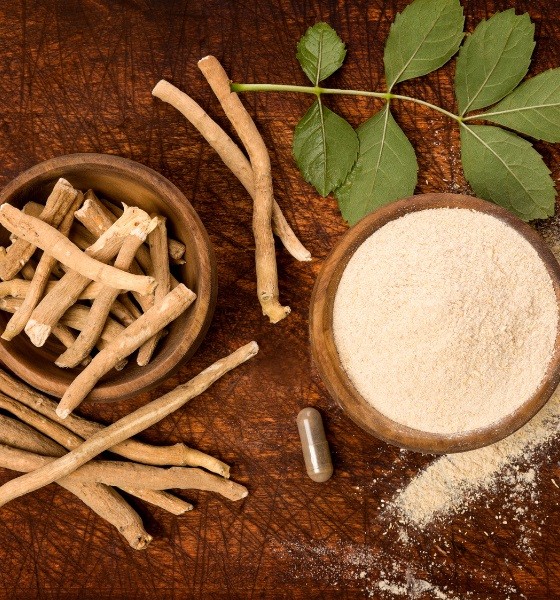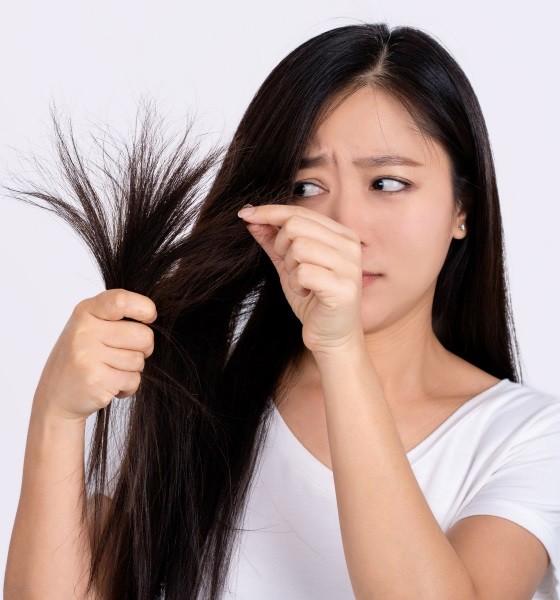Ashwagandha provides several benefits for hair such as reducing hair loss and promoting hair growth. This herbal remedy is known for its ability to strengthen hair follicles and nourish the scalp, resulting in healthier and thicker hair.
The natural antioxidants in ashwagandha help to protect the hair from damage caused by free radicals and oxidative stress. Regular use of ashwagandha can also improve blood circulation to the scalp, which stimulates hair growth and prevents premature graying.
Whether used topically or consumed as a supplement, ashwagandha is a natural and effective way to enhance the health and appearance of your hair.
What Is Ashwagandha?

Origin And History
Ashwagandha, also known as Withania Somnifera, is a powerful herb that has been used in the ancient Indian system of medicine, ayurveda, for centuries. Its name actually translates to “the smell of a horse,” which refers to both its unique odor and its ability to provide strength and vitality, much like that of a horse.
Let’s dive deeper into the origin and history of this remarkable plant.
- This herb is native to the dry regions of India, Africa, and the middle east, where it thrives in sandy soil and dry climates.
- Ashwagandha has been recorded in ancient texts dating back over 3,000 years, such as the Charaka Samhita and Sushruta Samhita, which are foundational texts of Ayurvedic medicine.
- Ayurvedic practitioners have long revered ashwagandha for its adaptogenic properties, meaning it helps the body adapt to stress and promotes overall well-being.
- In Ayurveda, ashwagandha is classified as a rasayana herb, which is believed to have rejuvenating and life-prolonging effects when used regularly.
- Over time, ashwagandha has gained attention around the world for its numerous health benefits beyond adaptogenic support.
Scientific Name And Classification
Ashwagandha belongs to the botanical family Solanaceae, commonly known as the nightshade family. Its scientific name is withania Somnifera. Here are some key details about the scientific classification and characteristics of ashwagandha:
- Kingdom: Plantae (plants)
- Order: Solanales
- Family: Solanaceae (nightshade family)
- Genus: Withania
- Species: Somnifera
Ashwagandha is an evergreen shrub that can grow up to three feet in height. Its leaves are elliptical and about three to five inches long. The plant produces small, greenish-yellow flowers and small orange-red fruits, which contain the herb’s prized medicinal compounds.
Ashwagandha root is the most commonly used part of the plant for its therapeutic benefits, and it is typically dried and crushed to make various forms of herbal preparations. Now that we have explored the origin and history, as well as the scientific name and classification of ashwagandha, we can delve deeper into its therapeutic benefits for hair health.
Properties And Composition Of Ashwagandha

We will delve into the properties and composition of ashwagandha, exploring the active ingredients and their specific benefits, as well as the nutritional profile of this powerful herb.
Active Ingredients And Their Benefits:
- Withanolides: One of the key compounds found in ashwagandha is withanolides. These bioactive compounds have been shown to possess anti-inflammatory and antioxidant properties, which can help combat scalp inflammation and oxidative stress. By reducing inflammation and neutralizing harmful free radicals, withanolides promote a healthy environment for hair growth.
- Steroidal lactones: Ashwagandha contains a group of natural compounds called steroidal lactones, including withaferin a and withanone. These compounds have been found to possess anti-inflammatory and immunomodulatory properties, which can help alleviate scalp conditions such as dandruff and itching. They also have a nourishing effect on the hair follicles, promoting healthy hair growth.
- Amino acids: Ashwagandha is rich in amino acids, the building blocks of proteins. Proteins, such as keratin, are essential for hair structure and strength. The amino acids in ashwagandha help support the production of keratin, thereby improving hair quality and reducing breakage.
- Essential minerals: Ashwagandha contains essential minerals, including iron, magnesium, and zinc, which play crucial roles in hair health. Iron is vital for proper blood circulation, ensuring that the hair follicles receive an adequate supply of nutrients and oxygen. Magnesium helps maintain a healthy scalp and may prevent excessive hair shedding. Zinc, on the other hand, plays a key role in DNA and RNA synthesis, supporting the growth and repair of hair cells.
Nutritional Profile:
- Vitamins: Ashwagandha contains various vitamins, including vitamin C, vitamin E, and the B-complex vitamins. Vitamin C helps stimulate collagen production, promoting hair strength and elasticity. Vitamin E is a potent antioxidant that protects hair follicles from damage caused by free radicals. B vitamins, such as biotin and niacin, are essential for overall hair health, aiding in the production of proteins and improving blood circulation to the scalp.
- Fiber: Ashwagandha is a good source of dietary fiber, which aids in digestion and helps maintain a healthy gut. A healthy gut is crucial for nutrient absorption, ensuring that the body can effectively utilize the vitamins and minerals necessary for hair growth.
- Phytonutrients: Ashwagandha contains various phytonutrients, such as flavonoids and alkaloids, which contribute to its overall health benefits. These compounds have antioxidant and anti-inflammatory properties, protecting the scalp and hair follicles from damage caused by environmental stressors.
Ashwagandha is a treasure trove of beneficial compounds that can promote hair health and combat various scalp conditions. The active ingredients, such as withanolides and steroidal lactones, possess anti-inflammatory, antioxidant, and nourishing properties that support hair growth and scalp health.
The nutritional profile of ashwagandha, including amino acids, essential minerals, vitamins, fiber, and phytonutrients, contributes to overall hair health and strength. Incorporating ashwagandha into your hair care routine may lead to healthier, stronger, and more vibrant locks.
So, if you’re looking to enhance the health of your hair naturally, consider harnessing the power of ashwagandha and unlocking its remarkable benefits for your locks.
Ashwagandha solves Common Hair Problems

Hair Loss:
Hair loss is a common hair problem experienced by many people, both men and women. There are various causes of hair loss, including hormonal imbalances, hereditary factors, stress, and certain medical conditions. Ashwagandha can help combat hair loss due to its ability to regulate hormonal levels in the body, including the hormone responsible for hair growth.
It also has antioxidant properties that protect hair follicles from damage caused by free radicals. By promoting hair regrowth and reducing hair shedding, ashwagandha can help prevent and address hair loss issues.
Dandruff:
Dandruff is a common scalp condition characterized by flaky and itchy skin. It can be caused by a variety of factors, including dryness, fungal infection, or excessive oil production on the scalp. Ashwagandha possesses antimicrobial properties that can help combat fungal infections on the scalp, which often contribute to dandruff.
The herb also has moisturizing properties that can alleviate scalp dryness, reducing the occurrence of dandruff. Regular use of ashwagandha can help promote a healthy scalp, preventing dandruff and its associated problems.
Dryness And Brittleness:
Dry and brittle hair is a common issue caused by moisture loss and damage to the hair cuticles. Ashwagandha contains essential nutrients and antioxidants that can nourish and hydrate the hair strands, restoring their natural moisture balance. The herb enhances the production of natural oils in the scalp, preventing dryness and brittleness.
Ashwagandha helps repair damaged hair follicles and strengthens the hair shaft, making it less prone to breakage. By addressing dryness and brittleness, ashwagandha contributes to overall hair health and improves its appearance.
Ashwagandha offers numerous benefits for common hair problems such as hair loss, dandruff, dryness, and brittleness. Its ability to regulate hormonal levels, combat fungal infections, moisturize the scalp, and nourish the hair strands makes it an effective natural remedy. Regular use of ashwagandha can promote a healthy scalp and a beautiful head of hair.
Ashwagandha Benefits For Factors Affecting Hair Health

Genetics:
Hair health is influenced by genetics, which determines the natural characteristics of hair, such as texture, color, and growth patterns. Genetics plays a significant role in determining if an individual is more likely to experience hair loss or have naturally strong and healthy hair. While we cannot change our genetics, understanding their impact on hair health can help in finding appropriate solutions and treatments.
Poor Nutrition:
The food we consume has a direct impact on the health of our hair. Inadequate intake of essential nutrients, such as vitamins, minerals, and proteins, can lead to weak and brittle hair. A lack of iron, zinc, and biotin in the diet can cause hair loss and slow down the hair’s growth rate. Consuming a balanced diet that includes sources of these vital nutrients is crucial for maintaining healthy and vibrant hair.
Environmental Factors:
Environmental factors, such as pollution, UV radiation, and extreme weather conditions, can negatively affect hair health. Pollution can lead to the accumulation of dirt and toxins on the scalp, leading to hair damage and hair loss. Uv radiation from the sun can cause hair to become dry, brittle, and prone to breakage. Exposure to harsh weather conditions like extreme heat or cold can strip the hair of its natural moisture and make it more prone to damage.
Ashwagandha Promotes Hair Growth

Stimulates Hair Follicles
When it comes to hair growth, the health of hair follicles is of utmost importance. Ashwagandha contains natural compounds that can stimulate the activity of hair follicles, promoting the growth of new hair strands. By nourishing the hair follicles and encouraging the production of keratin, ashwagandha helps in improving hair thickness and density.
Increases Blood Circulation To The Scalp
Proper blood circulation is crucial for delivering essential nutrients to the hair follicles and maintaining their health. Ashwagandha has been found to increase blood flow to the scalp, ensuring that hair follicles receive an ample supply of oxygen and nutrients.
Ashwagandha Strengthens Hair

Fortifies Hair Shafts
- Nourishes the scalp: Ashwagandha possesses potent antioxidant properties that help combat free radicals, reducing scalp inflammation and ensuring optimal blood circulation. This nourishes the hair follicles and strengthens the hair shafts.
- Boosts collagen production: Collagen, the protein responsible for the structure and strength of your hair, is stimulated by ashwagandha. This results in thicker and healthier hair strands, reducing the risk of breakage.
- Increases keratin synthesis: Ashwagandha promotes the production of keratin, the protein building block of your hair. This enhances the strength and elasticity of your hair shafts, reducing the likelihood of damage.
Prevents Breakage And Split Ends
Say goodbye to those pesky split ends and fragile strands with the help of Ashwagandha. Here’s how it can prevent breakage and split ends:
- Enhances moisture retention: The moisturizing properties of ashwagandha help your hair retain hydration, preventing dryness and brittleness. Well-hydrated hair is less prone to breakage and split ends.
- Repairs damaged hair: Ashwagandha aids in repairing damaged hair by nourishing and strengthening it from root to tip. This repair mechanism helps prevent breakage and split ends, leading to healthier-looking locks.
- Provides essential nutrients: Packed with vitamins, minerals, and essential fatty acids, ashwagandha provides your hair with the necessary nutrients for strong and resilient hair strands. This reduces the risk of breakage and split ends caused by nutrient deficiencies.
Incorporating ashwagandha into your hair care routine can significantly strengthen your hair and prevent common issues like breakage and split ends. With its restorative properties, ashwagandha is a natural solution for achieving beautiful and resilient hair.
Ashwagandha Supplements
Ashwagandha supplements have gained popularity in recent years for their potential benefits for hair health. Ashwagandha has been used for centuries in traditional Ayurvedic medicine to enhance overall well-being.
Let’s explore the recommended dosage and the best time to take ashwagandha supplements for optimal results.
Recommended Dosage
When it comes to ashwagandha supplements, it is important to follow the recommended dosage to avoid any potential side effects. The appropriate dosage of ashwagandha may vary depending on an individual’s age, health condition, and other factors. However, a general guideline for adults is to take 300-500mg of standardized ashwagandha extract daily.
It is advisable to consult with a healthcare professional before starting any new supplement regimen to ensure it is suitable for your specific needs.
To maximize the benefits of ashwagandha for hair health, it is recommended to take the supplement consistently over a period of time. It may take a few weeks or months to notice the desired effects, as ashwagandha works gradually to support overall well-being and hair health.
Here are some key points about the recommended dosage of ashwagandha supplements:
- Start with a lower dosage and gradually increase it based on your body’s response.
- Dividing the daily dosage into two equal doses and taking them in the morning and evening may help maintain a steady level of ashwagandha in the body.
- Always check the label of the ashwagandha supplement for the recommended dosage and follow the instructions provided by the manufacturer.
- If you experience any adverse effects while taking ashwagandha supplements, such as digestive issues or allergic reactions, discontinue use and consult a healthcare professional.
Best Time To Take
To maximize the benefits of ashwagandha supplements, it is important to consider the best time to take them. While there is no specific time that works for everyone, it is generally recommended to take ashwagandha supplements in the morning or early afternoon.
This allows the body to absorb and utilize the nutrients throughout the day, promoting overall well-being.
Here are some key points about the best time to take ashwagandha supplements:
- Taking ashwagandha supplements on an empty stomach may enhance absorption and effectiveness. However, if you experience any stomach discomfort, you can take them with a small snack or meal.
- Avoid taking ashwagandha supplements close to bedtime, as they may cause mild stimulation and interfere with sleep for some individuals.
- Consistency is key when it comes to taking ashwagandha supplements. Try to establish a daily routine and take them at the same time each day to maintain a consistent level in your system.
Ashwagandha supplements can be a valuable addition to your hair care routine. Following the recommended dosage and taking them at the best time can help optimize their benefits for hair health. It is important that individual results may vary, and it is always advisable to consult with a healthcare professional before starting any new supplement regimen.
Ashwagandha Hair Masks
We will explore some DIY recipes and application tips for ashwagandha hair masks, as well as the frequency of use. So, let’s dive in and discover how to make the most of this amazing herb for your hair!
Diy Recipes And Application Tips:
- Ashwagandha and aloe vera mask: Mix 2 tablespoons of ashwagandha powder with 3 tablespoons of fresh aloe vera gel. Apply the mixture to your scalp and hair, making sure to cover all the strands. Leave it on for 30 minutes before rinsing it off with lukewarm water. This mask helps soothe scalp irritation, reduces dandruff, and adds shine to your hair.
- Ashwagandha and coconut oil mask: Combine 1 tablespoon of ashwagandha powder with 2 tablespoons of coconut oil. Warm the mixture slightly and apply it to your scalp and hair. Gently massage for a few minutes, ensuring that the oil is evenly distributed. Leave it on for an hour and then wash your hair with a mild shampoo. This mask helps moisturize and nourish your hair, preventing dryness and frizz.
- Ashwagandha and yogurt mask: Mix 2 tablespoons of ashwagandha powder with 3 tablespoons of plain yogurt. Apply the mask from the roots to the tips of your hair, ensuring complete coverage. Leave it on for 45 minutes before rinsing it off thoroughly. The combination of ashwagandha and yogurt helps strengthen the hair follicles, reduce breakage, and improve overall hair health.
- Ashwagandha and egg mask: Beat 1 egg and add 1 tablespoon of ashwagandha powder to it. Mix well until you have a smooth paste. Apply the mask to your scalp and hair, focusing on the roots. Leave it on for 30 minutes before washing it off with a gentle shampoo. This mask provides essential nutrients to your hair, promoting growth and minimizing hair fall.
Frequency Of Use:
To reap the maximum benefits of ashwagandha for your hair, it is recommended to use these hair masks 1-2 times a week. Consistency is key, as regular application will help nourish your scalp, strengthen your hair follicles, and improve overall hair health.
It is important to note that everyone’s hair is unique, so you can adjust the frequency according to your individual needs. Listen to your hair and observe the results to find the ideal routine for you.
Ashwagandha can be a powerful ally in your hair care routine. By incorporating it into your hair masks, you can enjoy its rejuvenating properties and promote healthier and stronger hair. Give these DIY recipes a try and embrace the natural goodness of ashwagandha for your locks!
Ashwagandha Oil For Hair
Ashwagandha oil, derived from the roots of the ashwagandha plant, is rich in antioxidants and nutrients that can nourish and strengthen your hair from within. Let’s explore the benefits of using ashwagandha oil for your hair and learn about effective massage techniques to maximize its potential.
Benefits Of Using Ashwagandha Oil:
- Strengthening hair follicles: Ashwagandha oil is packed with essential nutrients like iron, calcium, and vitamin D, which can help nourish hair follicles. This promotes healthier hair growth, reduces hair fall, and helps prevent premature greying.
- Moisturizing and conditioning: The natural oils in ashwagandha oil, such as fatty acids and sterols, help moisturize and condition the hair. They form a protective layer that prevents moisture loss, resulting in smoother, shinier, and more manageable locks.
- Relieving scalp irritation: Ashwagandha oil possesses anti-inflammatory and antifungal properties. When massaged into the scalp, it can help soothe irritation, reduce dandruff, and alleviate conditions like scalp psoriasis or eczema.
Massage Techniques And Results:
- Scalp massage with warm oil: Gently warm up ashwagandha oil and apply it to your scalp. Using your fingertips, massage the oil in circular motions for about 5-10 minutes. This technique helps improve blood circulation to the hair follicles, promoting stronger and healthier hair growth.
- Overnight scalp treatment: For a more intensive treatment, apply ashwagandha oil to your scalp before bedtime. Massage it in thoroughly and cover your hair with a shower cap or towel. Leave it overnight to allow the oil to deeply penetrate your scalp and nourish your hair follicles. In the morning, wash your hair as usual. This technique can provide excellent hydration and repair damaged hair.
- Regular usage and patience: Consistency is key when using ashwagandha oil. Incorporate it into your hair care routine by massaging your scalp with the oil at least once or twice a week. Results may vary, so be patient and persistent as it may take some time to see visible improvements in hair health and texture.
Always perform a patch test before using any new oil or product on your skin or scalp, especially if you have sensitive skin. If you experience any adverse reactions, discontinue use immediately and consult with a healthcare professional.
Precautions And Possible Side Effects
We will discuss the potential precautions and possible side effects of using ashwagandha for hair.
Potential Allergies Or Sensitivities:
- Allergic reactions: Some individuals may be allergic to ashwagandha or its constituents. Allergic reactions can lead to symptoms such as skin rash, itching, swelling, or difficulty breathing. If you experience any of these symptoms after using ashwagandha, discontinue its use and consult a healthcare professional.
- Cross-reactivity: Ashwagandha belongs to the same family as tomatoes, potatoes, and bell peppers. If you have allergies to these plants, you may be more likely to be allergic to ashwagandha as well. Exercise caution and consider consulting a healthcare professional before using ashwagandha if you have known allergies to these plants.
Interactions With Medications Or Medical Conditions:
- Blood sugar levels: Ashwagandha may lower blood sugar levels. If you are taking medications to control diabetes or have hypoglycemia, monitor your blood sugar levels closely when using ashwagandha. Adjustments to your medication dosage may be necessary, so consult your healthcare provider.
- Blood pressure: Ashwagandha has the potential to lower blood pressure. If you are already taking medications to control hypertension or have low blood pressure, using ashwagandha may further reduce your blood pressure. Regular monitoring and adjustment of your medication may be required, so consult your healthcare provider.
- Immune system suppression: Ashwagandha may have immunomodulatory effects. If you have a condition that affects your immune system or are taking medication that suppresses immunity, consult your healthcare provider before using ashwagandha to avoid any unintended interactions.
Frequently Asked Questions
What Are The Benefits Of Using Ashwagandha For Hair?
Ashwagandha promotes hair growth, strengthens hair follicles, reduces hair fall, and prevents dandruff and scalp infections.
Can Ashwagandha Help In Treating Hair Loss?
Yes, ashwagandha helps in treating hair loss by reducing cortisol levels, a hormone that contributes to hair fall.
How Can I Use Ashwagandha For Hair Growth?
You can consume ashwagandha capsules or add ashwagandha powder to hair masks, oils, or hair care products.
Does Ashwagandha Prevent Premature Greying Of Hair?
Yes, ashwagandha contains antioxidants that help in preventing premature greying of hair.
Are There Any Side Effects Of Using Ashwagandha For Hair?
Ashwagandha is generally safe to use, but it may cause allergic reactions or interact with certain medications. Consult a doctor before use.
Conclusion
The benefits of ashwagandha for hair are undeniable. This natural herb has been used for centuries in ayurvedic medicine to promote healthy hair growth and combat hair loss. Its powerful properties, including anti-inflammatory and antioxidant effects, help nourish and strengthen hair follicles from within.
By reducing stress and anxiety levels, ashwagandha also indirectly contributes to healthier hair growth. With regular use, ashwagandha can improve scalp circulation, reducing dandruff and dryness. Its ability to balance hormone levels makes it an excellent choice for those experiencing hormonal hair loss.
Whether you choose to consume ashwagandha in supplement form or apply it topically, the benefits for your hair are clear. Incorporating ashwagandha into your hair care routine can lead to thicker, stronger, and more vibrant locks. So, why not give this ancient herb a try and see the positive impact it can have on your hair?

